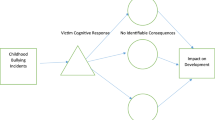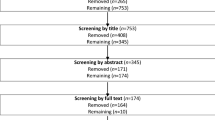Abstract
This article addresses how Maslow's hierarchy of basic human needs can be used as a framework for cross-cultural counseling with children in crisis; that is, children of the world who are unable to fulfill adequately their basic human needs because of extreme circumstances such as natural disaster, violence, various forms of child abuse, extreme poverty, lack of school and community resources, and emotional abandonment. Assessment of child needs is discussed and counseling strategies are presented; strategies that include supportive counseling techniques, crisis intervention techniques, program development, delivery of social services and resources, referral to helping agencies, and counselor consultation with parents and other significant adults in the lives of children.
Similar content being viewed by others
References
Albayrak-Kaymak, D. (1999). Internalizing or externalizing: Screening for problem youth. International Journal for the Advancement of Counselling, 21, 125-137.
American Psychiatric Association. (1994). Diagnostic and Statistical Manual of Mental Disorders (DSM-IV), (4th ed.). Washington, DC: Author.
Anastasi, A., & Urbina, S. (1997). Psychological testing (7th ed.). Upper Saddle River, NJ: Prentice Hall.
Becker, J. V., & Bonner, B. (1998). Sexual and other abuse of children. In R. J. Morris & T. R. Kratochwill (Eds.), The practice of child therapy (pp. 367-389), (3rd ed.). Boston: Allyn and Bacon.
Brundtland, G. H. (2000). Outstanding issues in the international response to HIV/AIDS: The WHO (World Health Organization) perspective. Paper presented at the XIII International AIDS Conference, Durban, South Africa.
Colvin, G., Tobin, T., Beard, K., Hagan, S., & Sprague, J. (1998). The school bully: Assessing the problem, developing interventions and future research directions Journal of Behavioral Education, 8, 293-319.
Daftuar, C. N., & Sharma, R. (1998). Beyond Maslow: An Indian perspective of need-hierarchy. Journal of the Indian Academy of Applied Psychology, 24, 1-8.
DeLay, T. (2000). Fighting for children. American Psychologist, 55, 1054-1055.
Gibson, R. L., & Mitchell, M. H. (1999). Introduction to counseling and guidance (5th ed.). Upper Saddle River, NJ: Merrill.
Gibson, R. L., Mitchell, M. H., & Basile S. K. (1993). Counseling in the elementary school: A comprehensive approach. Boston: Allyn and Bacon.
Glasser, W. (1965). Reality therapy. New York: Harper & Row.
Glasser, W. (2000). Reality therapy in action. New York: Harper Collins.
Gullotta, T. P., Adams, G. R., & Montemayor, R. (1995). Substance misuse and adolescence. Thousand Oaks, CA: Sage.
Hagerty, M. R. (1999). Testing Maslow's hierarchy of needs: National quality-of-life across time. Social Indicators Research, 46, 249-271.
Harper, F. D. (1998, August). Roles and challenges of counseling professionals for the new millennium. Paper presented at the Annual Conference of the International Association for Counselling, Paris, France.
Harper, F. D., & Deen, N. (2003). The international counseling movement. In F. D. Harper & J. McFadden (Eds.), Culture and Counseling: New Approaches (pp. 147-163). Boston, MA: Allyn and Bacon.
Harper, F. D., & Ibrahim, F. (1999). Violence and schools in the USA: Implications for counseling. International Journal for the Advancement of Counselling, 21, 349-366.
Harper, F. D., & Stone, W. O. (1986). Transcendent counseling: Toward a multicultural approach. International Journal for the Advancement of Counselling, 9, 251-263.
Harper, F. D., & Stone, W. O. (1999). Transcendent counseling (TC): A theoretical approach for the year 2000 and beyond. In J. McFadden (Ed.), Transcultural counseling: Bridging cultures (pp. 83-108), (2nd ed.). Alexandria, VA: American Counseling Association Press.
Harper, F. D., & Stone, W. O. (2003). Transcendent counseling: An existential, cognitive-behavioral theory. In F. D. Harper & J. McFadden, (Eds.), Culture and counseling: New approaches (pp. 233-251). Boston, MA: Allyn and Bacon.
Hickson, J., & Mokhobo, D. (1992). Combatting AIDS in Africa: Cultural barriers to effective prevention and treatment. Journal of Multicultural Counseling and Development, 20, 11-12.
Hoffman, A. M. (Ed.). (1996). Schools, violence, and society. Westport, CT: Praeger.
Israelashvili, M. (1999). Adolescents' help-seeking behaviour in times of community crisis. International Journal for the Advancement of Counselling, 21, 87-96.
Johnson, D. S. (1998). Community solutions to violence: A Minnesota managed care action plan. American Journal of Preventive Medicine, 14, 93-97.
Kaslow, F. W. (2001). Families and family psychology at the millennium. American Psychologist, 56, 37-46.
Kritsberg, W. (1985). The adult children of alcoholics syndrome. Pompano Beach, FL: Heath Communications.
Marshall, A. (2001, June). Life-career counselling issues for youth in coastal and rural communities: The impact of economic, social and environmental restructuring. Paper presented at the Annual Conference of the International Association for Counselling, Lonavla-Mumbai (Bombay), India.
Maslow, A. H. (1968). Toward a psychology of being (2nd ed.). New York: Van Nostrand Reinhold.
Maslow, A. H. (1970). Motivation and personality (2nd ed.). New York: Harper and Row.
Mays, V. M. (2000). A social justice agenda. American Psychologist, 55, 326-327.
McConnell, R. A., & Sim, A. J. (1999). Adjustments to parental divorce: An examination of the differences between counselled and non-counselled children. British Journal of Guidance and Counselling, 27, 245-257.
Mohapatra, K., & Rath, P. K. (2001, June). The teenage victims of the supercyclone in Orissa: Some therapeutic interventions. Paper presented at the Annual Conference of the International Association for Counselling, Mumbai, India.
Nicholson, J. A., & Golsan, G. (1983). The creative counselor. New York: McGraw-Hill.
Ntoi, V. (2001, June). HIV/AIDS in Lesotho: De-Constructing death to cope with loss. Paper presented at the Annual Conference of the International Association for Counselling, Mumbai, India.
Richards, B. M. (1999). Suicide and internalised relationships: A study from the perspective of psychotherapists working with suicidal patients. British Journal of Guidance and Counselling, 27, 85-98.
Roy, J. (2001). Response to the earthquake in Gujarat by Five R's (rapid response, rescue, relief, reconstruction and rehabilitation). Unpublished Report. Five R's Group, New Delhi, India.
Saigh, P. A. (1998). Posttraumatic stress disorder. In R. J. Morris & T. R. Kratochwill (Eds.), The practice of child therapy (pp. 390-418), (3rd ed.). Boston: Allyn and Bacon.
Shelby, J. S., & Tredinnick, M. G. (1995). Crisis intervention with survivors of natural disaster: Lessons from Hurricane Andrew. Journal of Counseling and Development, 73, 491-497.
Sizikova, T. (2000, May). Counseling in Russia. Paper presented at the Annual Conference of the International Association for Counselling, Thessaloniki, Greece.
Stockton, R., Kaladow, J. K., & Garbelman, J. (2001, June). Meeting the challenges ahead: The development and history of international counseling. Paper presented at the Annual Conference of the International Association for Counselling, Lonavla-Mumbai (Bombay), India.
Tatar, M. (1998). Counselling immigrants: School contexts and emerging strategies. British Journal of Guidance and Counselling, 26, 337-352.
Thompson, C. L., & Rudolph, L. B. (1983). Counseling children. Monterey, CA: Brooks/Cole.
Tobias, B. Q. (2001). A descriptive study of the cultural mores and beliefs toward HIV/AIDS in Swaziland, southern Africa. International Journal for the Advancement of Counselling, 23, 99-113.
Vontress, C. E., & Epp, L. R. (2000). Ethnopsychiatry: Counseling immigrants in France. International Journal for the Advancement of Counselling, 22, 273-288.
Author information
Authors and Affiliations
Corresponding author
Rights and permissions
About this article
Cite this article
Harper, F.D., Harper, J.A. & Stills, A.B. Counseling Children in Crisis Based on Maslow's Hierarchy of Basic Needs. International Journal for the Advancement of Counselling 25, 11–25 (2003). https://doi.org/10.1023/A:1024972027124
Issue Date:
DOI: https://doi.org/10.1023/A:1024972027124




